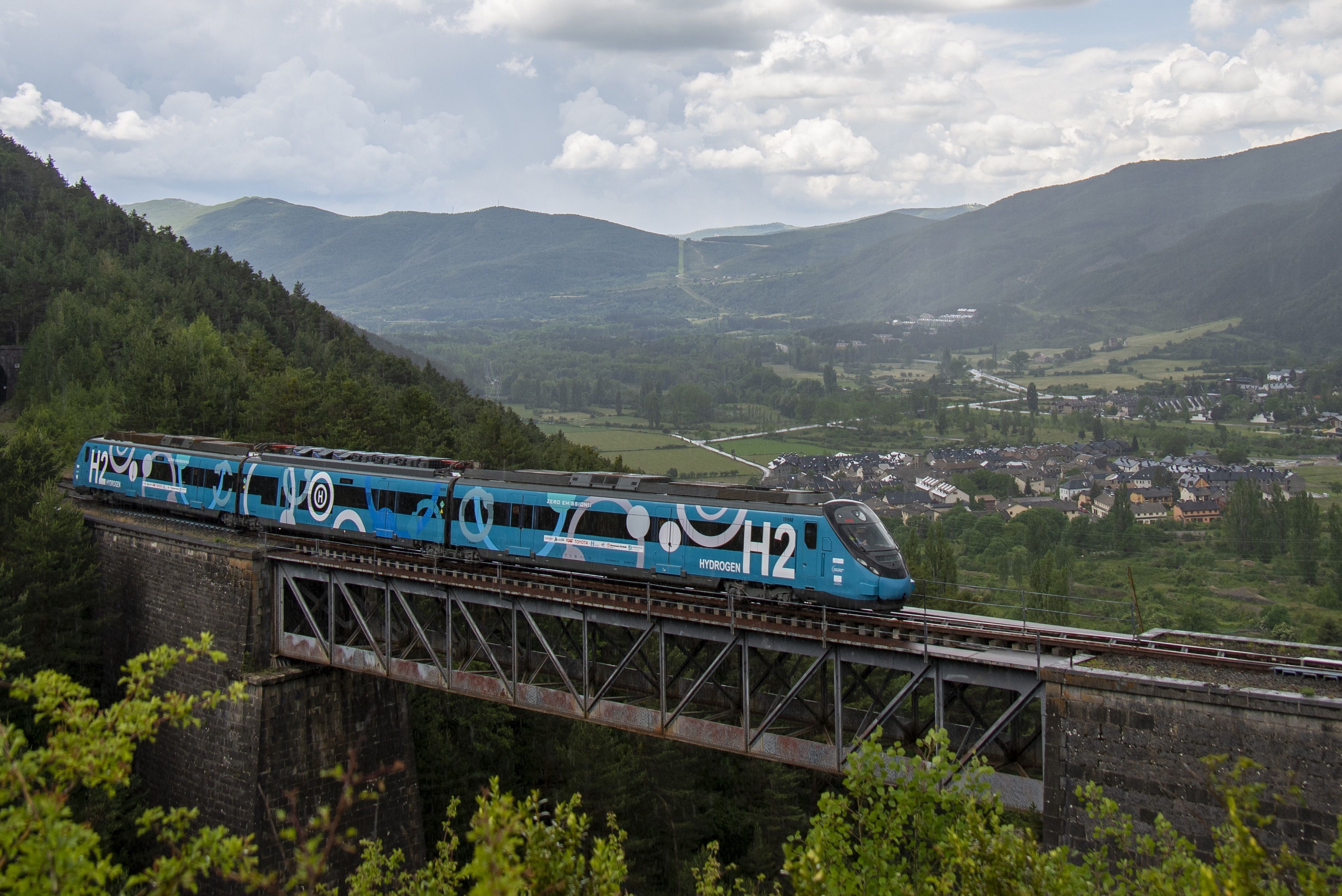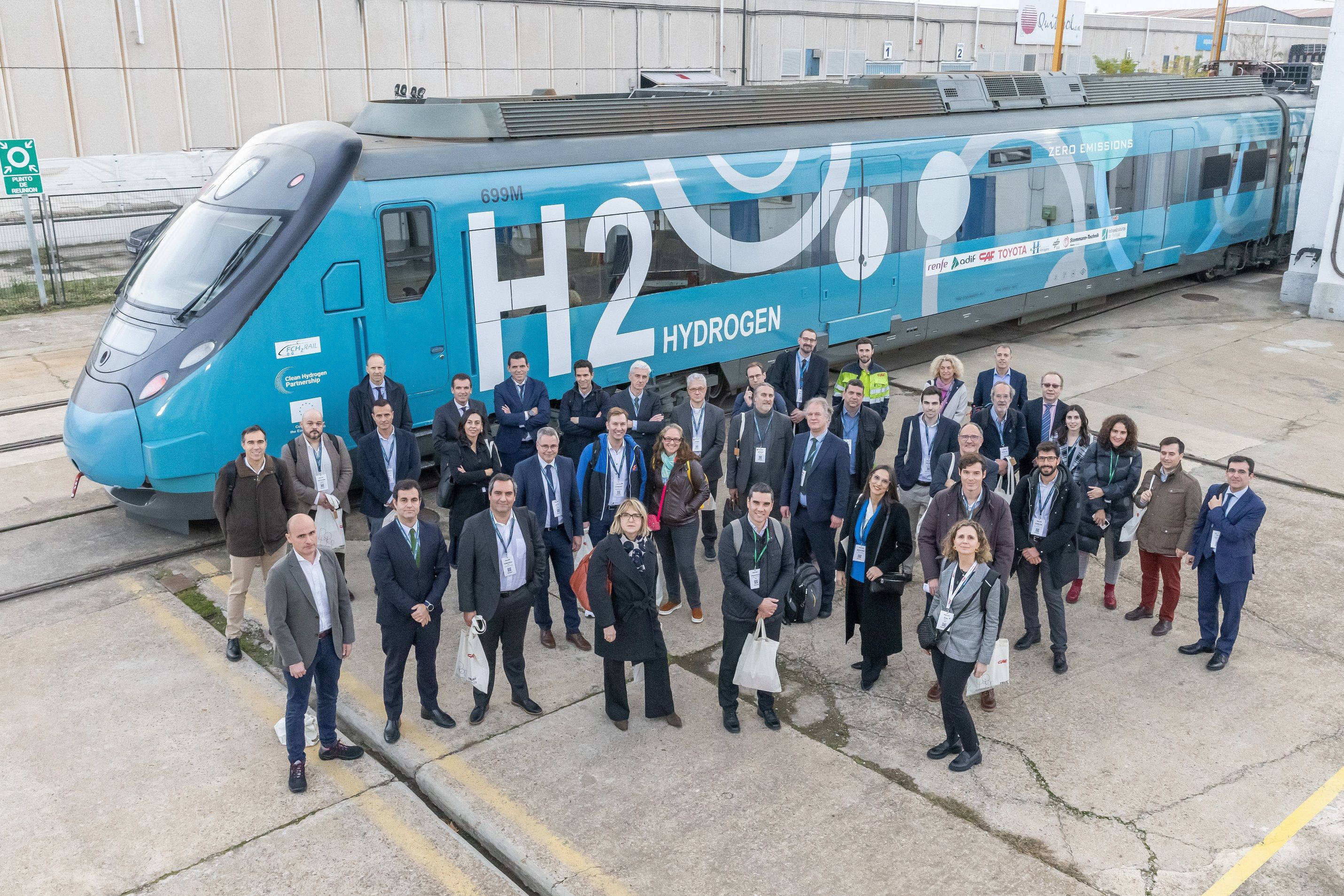The success of the project confirms the commitment to the development of innovative and emission-free fuel cell and battery hybrid technology to provide a competitive alternative to diesel trains in the current decarbonisation process.
The FCH2Rail project is being developed by a consortium made up of CAF, DLR, Toyota, Renfe, Adif, CNH2, IP and Stemmann-Technik, with a budget of 14 million euros.

The final event of the FCH2Rail project was held together with RailLive! 2024 congress, which is currently taking place in the city of Zaragoza. Over the past four years, the project has developed a bi-mode demonstrator train with hydrogen fuel cells and tested it on the Spanish and Portuguese railway networks.
The event began with a presentation on the development of the project and a detailed overview of the main highlights and achievements. Renfe’s director of Global Strategy, Paloma Baena, Jose Conrado and Iosu Ibarbia, CTOs of Adif and CAF and Emilio Nieto, director of CNH2, discussed in a panel session the results and the strategic conclusions of the FCH2RAIL project. This was followed by a tour of the hydrogen train. Visitors were able to experience a live ride on the hydrogen train on a journey between the CAF site in Zaragoza and the railway station in Villanueva de Gallego. The event was attended by Valerie Bouillon-Delporte, Director of the Clean Hydrogen Partnership, as well as key executives from the companies involved in the project and other companies that have actively supported the project.
The FCH2RAIL project had a planned duration of 4 years and a budget of over 14 million euros, of which around 70% was financed by European funds. It began in January 2021, when the FCH JU (now superseded by the Clean Hydrogen Partnership), the European Commission's agency to promote the development of hydrogen and fuel cells, selected the FCH2RAIL proposal. The project objective of developing an innovative hydrogen-powered prototype train was achieved with flying colours by the project partners CAF, DLR, RENFE, TOYOTA MOTOR EUROPE, ADIF, IP, CNH2 and FAIVELEY Stemmann Technik.
The so-called Fuel Cell Hybrid PowerPack was developed and manufactured for an existing commuter train provided by Renfe. This innovative zero-emission power generation system uses electrical energy from hydrogen fuel cells and LTO batteries to power the train on nonelectrified lines, and the overhead line where available. This is the first demonstrator train with hydrogen fuel cells on the Iberian Peninsula.
The first phase of the project, which began in 2021, consisted of developing the new power generation solution and integrating it into the vehicle's existing traction system. To this end, the Fuel Cell Hybrid PowerPack was tested outside the vehicle and the function of the energy management system was validated and optimised. Once the demonstrator train was completed, the static tests began in 2022 at the CAF plant in Zaragoza, where the correct installation and integration of the new system was tested by checking all interfaces and their correct functioning, as well as carrying out the hydrogen tightness tests and the first hydrogen refuelling of the train to supply the fuel cells.
In mid-2022, the dynamic tests of the unit began, initially on closed tracks, which served to optimise the new system and equipment, to later begin these tests on external tracks. This involved optimising the hybridisation of fuel cells and batteries on the routes defined as representative in the project, simulating commercial operation on all routes and thus testing the new system in a wide range of power demand conditions.
One of the most important milestones of the project was the granting of authorisation for tests on the Spanish national network and the departure of the vehicle for the first test run on the Zaragoza-Canfranc route in the Aragonese Pyrenees. This marked Adif's first authorisation for the test operation of a hydrogen train in the RFIG, with all the risk analysis and safety validation processes associated with the testing of new technologies being carried out. The arrival of the train at Canfranc station in the Aragonese Pyrenees demonstrated the reliability of the technology used. The route from Zaragoza to Canfranc is particularly demanding due to its steep and high ramps, which poses a major challenge for the new on-board power generation systems.
To test the new technology in a wide range of power and energy demand conditions, the train then travelled for several months on different routes, mainly in Aragon, Madrid and Galicia. The scenarios demonstrated included operation under different climatic and operational conditions. In total the prototype has travelled more than 10,000 km in hydrogen mode.
During the train's stay in Galicia, another important milestone of the project was reached when the train crossed the border and was tested on a Portuguese route. This allowed a more comprehensive characterisation of the new technology for a later assessment of the competitiveness of the new bi-mode hybrid propulsion solution with hydrogen fuel cells as a sustainable alternative to the currently used diesel traction.

Furthermore, the FCH2RAIL Consortium has fulfilled another fundamental objective, namely, to participate in European standardisation committees for rail transport to promote the development of new standards or the updating of existing ones that provide the necessary conditions for the inclusion of hydrogen and fuel cell technology in the European rail network.
All in all, the success of the project confirms and reinforces the commitment of the companies that make up the FCH2Rail consortium to the development of environmentally friendly mobility solutions. In this context, the growing interest of numerous public and private transport authorities within and outside the EU in hydrogen fuel cell technology in rail transport in recent years should be emphasised.
 .
.